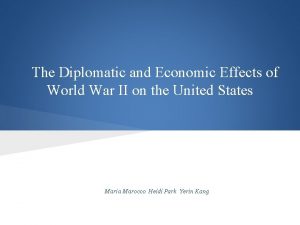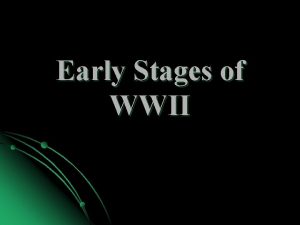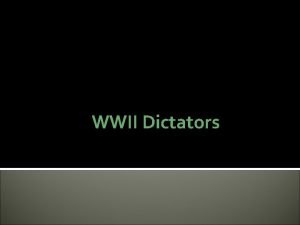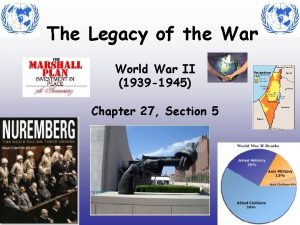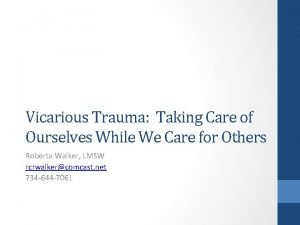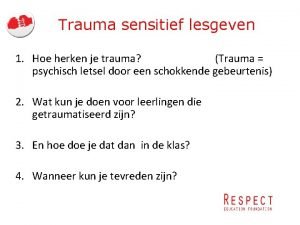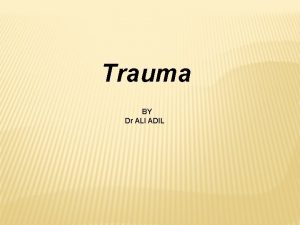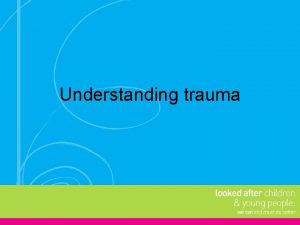Social Effects of WWII Social Effects Psychological Trauma
























- Slides: 24

Social Effects of WWII

Social Effects - Psychological Trauma • There was psychological shock, but it was less than WWI because people knew: – What to expect – Feared the worst – There was a need for the war – The price of failure was unacceptable

Social/Economic Effects –Technology Creates Psychological Trauma/Cold War • War led to an increase in scientific and technological development – V-2 rocket – Nuclear weapons • Led to more flexibility in war planning and the countries on the offensive to have the advantage • Led to Cold War

Social Effects - Civilians • Civilian deaths from WWII was much greater due to technology • Everyday life was effected: – – – Food rationing was introduced Conscription into army Daylight savings time introduced to extend the work day Strikes were illegal Propaganda Blackouts Air-raid drills; bomb shelters Forced labor and internment Displacement from invading army Fear of losing loved one; loss of breadwinner Terror from effects of bombing; homelessness

Social Effects - Women • Women took on many of the roles that had traditionally belonged to men • Many people belonging to minority groups also took on jobs that traditionally they had not • Women took on jobs in the war effort, including those such as: – Military nurses – working near battles around the world to save wounded men – Factory workers – building the machines necessary to fight wars – Journalists – reporting the happenings of the battle front to news agencies in their home countries

Social Effects - Women • The most common job for a woman to take on during the World War I or II was that of a nurse • At first men doubted that the women would work well in a battle situation, but those doubts quickly disappeared after the nurses proved themselves

Social/Economic Effects Minorities • Women were not the government's only target for recruitment • The government also decided to begin recruiting more minorities for many of the same reasons it began recruiting women • In World War II, they recruited nearly over a million African Americans to be in the military and work in the factories • However, riots and strikes occurred protesting their rise in status

Social Effects - Minorities • African-American soldiers played a significant role in World War II • Nearly 700, 000 served in Europe and accounted for 20% of the military forces

Social Effects - Minorities • Despite the numbers they faced racial discrimination: – Racially segregated forces – Blacks were often classified as unfit for combat and were not allowed on the front lines – Blacks were mostly given support duties – No blacks were given the Medal of Honor during either world war

Social Effects - Minorities • Nonetheless, progress was made: – Black combat units proved they could fight just as well as whites – The the U. S. military was integrated in 1948, but black soldiers were still kept in separate units during the Korean War – The Tuskegee Airman, the first group of black pilots ever trained by the Air Force gained legendary status – Double V campaign drew public support – Truman set up the Committee on Civil Rights

Social Effects – Women & Minorities • The first and second World Wars did much to awaken the women and minority groups • For the first time since the Civil War era, African American rights became an issue (the issue of segregation in the military) • It is now commonplace for women to hold jobs, their role in society has expanded greatly since the era prior to World War I

Economic Effects • When the men came back and many women went back to the kitchen • There was a huge growth in munitions/ aircraft industries – other industries (eg house building) were put on hold • There was a huge emphasis on food production – Dig for Victory

Economic Effects • Rationing – notably of oil and food • Shortages of workers – • The Government had to take control of the economy – Took over the running of railways – Purchased and supplied raw materials for armament factories – Some materials were simply demanded – Food rationing was introduced • Training of workers was disrupted, so there was a lack of good management

Economic Effects - Creation of the IMF, WTO, and World Bank • The Bretton Woods Conference (1944) set up the: – International Monetary Fund to try to prevent another world economic depression. It keeps track of the flow of goods going to and from countries and stabilizes the exchange rate – The World Bank was established to provide finance (loans) and advice to reduce poverty – The International Trade Organization (ITO) was formed to try to regulate and insure free trade

Economic Effects • Massive government debts were accumulated, particularly to America (Lend -Lease) • Huge losses of merchant shipping to submarines • Destruction of factories/machines – in 1945 Britain lost 12% of her productive capacity • Destruction by bombing created a need for massive house building after the war

Destruction • Immense destruction of infrastructure – 1/3 of the homes in Britain were destroyed – Coal production was at 40% prewar levels – 23% of Europe’s farmland was out of production • This led to a severe crisis during the winter of 1946 -7

Displaced People • 20 million people had been uprooted from their homes and were displaced because: – Refugees who fled before invading armies – Slave-workers were taken to Germany and Austria – Prisoners in concentration and death camps

Deaths • 30 million people were killed

United Nations • Created in 1945 to replace the League of Nations • Main purposes are: – Maintain world peace – Develop good relations between countries – Promote cooperation in solving the world’s problems – Encourage respect for human rights • Was more successful because it included more nations than the League

Internal Stresses • Within formerly occupied countries, there was internal stress between those who had collaborated and those who had resisted • In Greece, this led to a civil war

Failure of Fascism • Its militarism led to defeat • Its anti-Bolshevism had led to the extension of Bolshevism over much of Central and Eastern Europe

Origins of the Cold War – Superpower Status After WWII • With the serious weakening of Britain and France as world powers, only the U. S. and USSR were left as superpowers

End of European Domination • The U. S. emerged clearly as the world superpower – Germany was destroyed as a great power – Britain and France were destroyed as great imperial powers

End of European Domination • The USSR had: – Recovered and expanded its empire – Became the dominant military power on the continent of Europe – Acquired enormous prestige as the chief opponent and victor over Nazism – Was the leading communist power – Found itself the only one of the former Great Powers able to resist U. S. domination
 Effect
Effect Psychological trauma
Psychological trauma Ww2 military alphabet
Ww2 military alphabet Advances in technology during wwii
Advances in technology during wwii What is the nye committee
What is the nye committee Wwii picture
Wwii picture Wwii picture
Wwii picture Ww2 study guide answer key
Ww2 study guide answer key Color tv started
Color tv started 1500 dead in hawaii congress votes war
1500 dead in hawaii congress votes war Causes of wwii
Causes of wwii Nazi germany map
Nazi germany map Wwii
Wwii Could wwii have been prevented
Could wwii have been prevented Wwii test review
Wwii test review Apush wwii dbq
Apush wwii dbq Social thinking and social influence in psychology
Social thinking and social influence in psychology Social thinking social influence social relations
Social thinking social influence social relations Vicarious felidae
Vicarious felidae Trauma gestig behindert
Trauma gestig behindert Jenis trauma thorax
Jenis trauma thorax Trauma symptom checklist for children™ screening form
Trauma symptom checklist for children™ screening form Trauma sensitief lesgeven
Trauma sensitief lesgeven Trauma awareness and treatment center utah
Trauma awareness and treatment center utah 4 r's trauma informed care
4 r's trauma informed care
